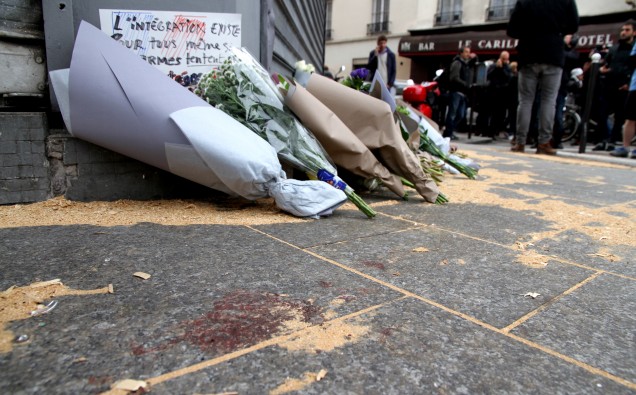
While counterterrorism experts will work round the clock to analyze reasons and flaws that allowed suicide bombers to roam streets of Paris undetected and mount the deadly attacks, newest entrants in Europe – the Middle Eastern refugees – are hoping that the catastrophe would not exacerbate their troubles.
The attacks shocked people around the world, as media reports and photos of the victims unified countries in condemning the killing of innocent French citizens.
But the attacks are also a horrible news for Muslims migrants seeking refuge in Europe in one of the largest humanitarian disasters spreading out of the Middle Eastern chaos.
Even before the attacks some right wing European political parties and the media raised questions over arrival of Muslim refugees from Syria, Iraq and elsewhere streaming into Europe, asking if they posed a security threat.
French investigators are piecing together information how militants from Islamic State (ISIS) wreaked havoc in one of the world’s top tourist destinations Friday night. The shootings and bombings left at least 129 dead and more than 300 injured, several dozens of them in critical condition. According to French newspaper Le Monde one of the suicide bombers in the attacks has been identified as Ismael Omar Mostefai.
Amid widespread international expression of support, French President Francois Hollande has reacted with a vow to launch a merciless war on the ISIS or Daish as the terrorist outfit is called in the Middle East.
Nevertheless, implications could be serious if it becomes clear that the attackers had some links to the refugee migration, although the migrant families fled state and militant terror raging in their home countries.

“Peace for Paris” by Jean Jullien Vectorized by Paris 16. – Poignant Eiffel Tower Peace Symbol went viral in the wake of Paris Terrorist Attacks TIME.. Licensed under Public Domain via Commons
The level of coordination and sophistication in near simultaneous attacks on six sites exposed gaping holes in French intelligence and security agencies which were long bracing for such attacks, especially after assaults on the satirical weekly Charlie Hebdo and a supermarket in January that killed 18 people.
Paris attacks were the bloodiest since the 2004 train bombings in Madrid that claimed 191 lives.
While gunmen attacked apparently soft targets, including a Cambodian restaurant and the Bataclan music hall, how two suicide bombers breached the presidential security to come closer to a stadium where the French president was watching a football match, was astounding.
Experts say the kind of coordinated attacks that involved three teams, needed not days and weeks, but months of meetings, discussions and conversation to plan, which were all missed by the security agencies. Attackers picked up targets that required reconnaissance and surveillance and planning to coordinate logistics.
France is a strong U.S. ally fighting the Islamic State. Conversely, thousands of Frenchmen had travelled to Syria to fight alongside Daesh militants, many of whom have since returned, loaded with militant ideology.
Revelations that at least one of the attackers entered France through Greece, along with Syrian refugees fleeing conflict in their homeland, have raised a fundamental question as to how the open border policy can be maintained, or if the refugees can pose a greater terrorism risk.
The scale of refugee influx, and the fact that many Westerners have inculcated the“Jihadi” ideology, has made it virtually impossible for border authorities to tell the people crossing the border are genuine immigrants.
Poland’s refusal to allow refugees in the wake of Paris attacks will fuel debate over the issue which has already divided Europe and may force re-thinking as to how to handle the relentless stream of people flowing out of not just Syria, but countries like Iraq and Afghanistan. France has a long history in the Middle East and, being a colonial power, has in a way an inextricable links with countries like Syria and Tunisia. France is, therefore, a natural conduit or recipient of lot of refugees.
The EU refugee plan calls for relocating some 160,000 refugees registered in Greece and Italy to 28-member bloc. Some countries have resisted pleas to take in their share.
Another fallout of the Paris attack is the rise of right-wing extremists who are certain to capitalize on such horrific incidents, and may try to further polarize public opinion, particularly around the refugee issue.
The right-wing fringes can justify ideological battle and aggressiveness because of incidents like this that can create a very dangerous scenario of polarization on the basis of religion. Some rights activists fear France and Europe might compromise their liberty, and even profile ethnic communities – which would be a setback for modern civilization.
An indication of this unlikeable scenario is the statement of far-right leader of the Front National, Marine Le Pen, who speaking on French television said that France must determine who its friends are and who its enemies are. “France’s enemies are those who maintain links with Islamism.”
Meanwhile, refugees – men, women and children including young professionals and long-term economic talent – who have reached Europe after overcoming trials and turbulence of sea and land journeys hope that these attacks do not deprive them of the newfound prospects of living peacefully – far from the multiple conflicts and carnage that pushed the whole region into a cauldron.
The featured image is by Maya-Anaïs Yataghène from Paris, France (Paris Shootings : The day after) being used under creativecommons licenses via Wikimedia Commons













